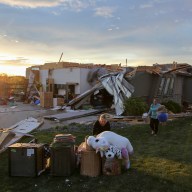KINGSTON, Ont. – Two days before Mohammad Shafia was arrested for the murder of his three daughters and one of his two wives, he went on a vitriolic rant about his dead children, cursing and condemning their supposed treachery — and then he washed his hands.
It was a profound, if coincidental, end to a hateful rant from a man found guilty Sunday along with his son and wife of four counts of first-degree murder committed, court heard, for reasons most Canadians would find trivial such as dating.
But with that hate-filled diatribe Shafia made it clear he was indeed washing his hands of his daughters, comparing them to prostitutes, telling himself that he “did well” and would do the same again if they came back to life 100 times.
“They committed treason themselves,” Shafia said on a secret wiretap police recorded by bugging his minivan.
“It was all treason, they committed treason from beginning to the end. They betrayed kindness, they betrayed Islam, the betrayed our religion and creed, they betrayed out tradition, they betrayed everything. Let’s stop here, get out and wash my hands and come back. OK.”
It was July 20, 2009, and his daughters and wife had not yet been dead three weeks. On June 30, 2009, court heard, Shafia, his favourite wife Tooba Yahya, 42, and their eldest son Hamed, 21, killed three troublesome Shafia daughters and Rona Amir Mohammad, the unwanted first wife.
They had come up with an elaborate, though clumsily staged, plan to drown the four, then place their bodies in a car, send it plunging into a canal and make it all look like a tragic accident.
The physical evidence and intricate technical aspects of how the Crown said the murders took place paint a picture of a lot of planning but many mistakes. But it is the why, more than the how, that has riveted people across the country and beyond.
Trouble in the wealthy Afghan-Canadian family had been brewing for some time.
The Crown painted a picture of a household controlled by a domineering Shafia, with Hamed keeping his sisters in line and doling out discipline when his father was away on frequent business trips to Dubai.
Some of the Shafia children followed the rules and the others didn’t. The ones who couldn’t be controlled, the Crown said, are now dead.
Rona was not treated much better than an unruly child, court heard. And all any of them wanted was freedom, the Crown said.
Zainab had run away, but that in itself shamed the family, so she was coaxed back with a promise to marry her boyfriend Ammar, the Crown said. The family viewed him as a loser and was not pleased with the relationship, but if she was married she would be Ammar’s problem, not theirs, and her behaviour couldn’t affect their honour.
Sahar too was dating, though she tried to keep her Christian boyfriend secret from her parents. Condoms were found in her room, as were pictures of her wearing short skirts and shorts, hugging her boyfriend. That clothing caused Shafia to curse Sahar as a whore after her death.
Two months before she was found in the canal, Sahar told her boyfriend’s aunt that if her parents found out about her relationship she was “a dead woman.”
Geeti was becoming almost impossible to control: skipping school, failing classes, being sent home for wearing revealing clothes and stealing. But her most egregious breach was telling almost every authority figure she encountered that she wanted to be sent to foster care, the Crown said.
There was a family code of silence and Geeti broke that, it was alleged. If the Shafias thought Zainab and Sahar were hard to control, Geeti would be their worst nightmare. For Geeti, the writing was on the wall, the Crown said.
Rona was Shafia’s first wife but, unable to conceive, her status in the Shafia household began eroding as soon as a young Tooba Yahya was brought in as a polygamous wife, court heard.
Shafia beat her and “made life a torture,” Rona wrote in a diary. Yahya called her a servant, held onto Rona’s passport and would tell her “your life is in my hands,” she said.
Rona spent her days wandering the streets, crying, sitting in her room or using payphones to call relatives, she wrote.
Rona, Zainab, Sahar and Geeti died at the tail end of a family trip to Niagara Falls, Ont. They were heading back to Montreal and had stopped in Kingston for the night when tragedy struck.
Zainab secretly took the family’s Nissan Sentra, bought used just one day before they left on the trip, and went for a spin with the three others, the family said. They told police that was the last they saw of Zainab.
Hamed would later tell a private investigator of sorts hired by Shafia that he saw the car full of his relatives leave the motel that night and he followed them, concerned for their safety. He followed in the family’s Lexus SUV. They ended up at the locks, where Hamed said he rear-ended them accidentally and urged them to turn around.
As he was picking up some pieces of broken headlight, he heard a splash, he said. The car had plunged into the water.
So, he said, he sounded the horn of the Lexus once as a call for help, and took a rope from the trunk and dangled it in the water, dropping some pieces of headlight where they were later found. Seeing no signs of life, he said he drove straight home to Montreal, calling police only to report an accident he admitted he staged to mask damage to the Lexus.
He never mentioned his dead family members.
The Crown said that story was a “complete fabrication,” and the jury evidently agreed. Really, the girls and Rona never even made it to the motel, the Crown said. They were driven to the canal and killed there, court heard. Why else would Hamed and Shafia have checked into the motel for six people when they were a family of 10, the Crown noted.
In fact, the whole “family vacation” itself was a farce, they said; an integral part of the mass murder plan.
By the time they were heading home, passing through Kingston around 1:30 a.m., the plot was going according to plan, the Crown said. They had left Niagara Falls so late in the day that it was pitch black when they passed through Kingston, then got off the highway at the exit for the locks at Kingston Mills. They had stopped there to use the washroom on the way to Niagara Falls, so if any of the kids or Rona — sleeping soundly in the Nissan — woke up, waiting there wouldn’t be suspicious, the Crown said.
Yahya waited in the car with the soon-to-be victims while Shafia and Hamed checked into the motel, leaving their other children there.
When father and son return, Rona and the girls are drowned in one of the several areas of open water, either to the point of unconsciousness or death, the Crown said. The cause of death for all four was drowning.
The Crown had no direct proof to cement that theory, but the idea that they were dead before the car went in the water hangs on a few pieces of evidence. Experts testified that markings on the bottom of the Nissan show it got hung up on the ledge when it first was sent over.
That’s why the Lexus was used to push it in, and that’s why there were pieces of its head lights at the scene, the Crown said, not because Hamed was there and rear-ended them.
There’s also the evidence that makes it seem like nobody tried to escape the car during its plunge into the water or as it submerged in the canal. The driver’s window was fully open, nobody was wearing a seat belt, and their bodies were found more or less floating over seats — Zainab and Geeti in the front, Sahar and Rona in the back.
The car was found in the morning around 9. The headlights were off and so was the ignition. The evidence simply did not fit with an accident scenario, the Crown said.
The police certainly didn’t think so, and began to treat the deaths as suspicious almost immediately. By the time Shafia, Yahya and Hamed were arrested, the case against them included the intercepted conversations. Comments mostly made by Shafia on those wiretaps provided the foundation for the Crown’s “honour killing” theory.
“I say to myself, ‘Would they come back to life a hundred times, for you to do the same again,'” Shafia says on one. “That is how hurt I am. Tooba, they betrayed us immensely. They violated us immensely. There can be no betrayal, no treachery, no violation more than this.”
“Even if they hoist me up onto the gallows…nothing is more dear to me than my honour,” Shafia says on another.
















